
This focus area centers on identifying Service Members, Veterans and Their Families (SMVF) and how to most effectively screen for suicide risk. To take that first step to help someone, you have to first ask the question: Have you, or a member of your immediate family, ever served in the military?
Why not simply ask “Are you a veteran?” Many people who have served in the military — and who meet the legal definition of “veteran” — do not self-identify as veterans. Some assume that only individuals who serve in combat qualify as veterans. Some believe that they did not serve long enough to be a veteran. Some believe that their character of discharge is too low.
Consequently, individuals who are veterans all-too-often respond “no” to the question of “Are you a veteran?” By contrast, responses to “Have you, or a member of your immediate family, ever served in the military?” tend to be more accurate in identifying veterans in our midst — which is why we prefer to ask the question in this manner.
Get help now if you are thinking about suicide or if you are worried about a friend or loved one, call the Veteran Crisis Line to get help now. The Veteran Crisis Line is free, confidential, and available 24/7.

The Columbia Protocol — also known as the Columbia-Suicide Severity Rating Scale — is a simple series of questions that anyone can ask. Answers to these questions correspond to a scale, which has been repeatedly proven to be an extraordinarily accurate predictor of someone’s level of risk of suicide.
There is no mental health training required. Users of the Columbia Protocol ask people:
Free Columbia Protocol training resources can be found here.
When working with members of the military, veterans, and their families, cultural competency is an important component to making connections. Learn more by watching this brief PsychArmor video and find more resources at this SAMHSA link.